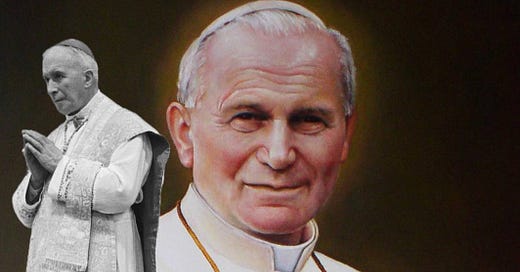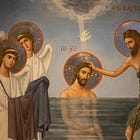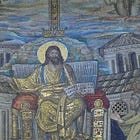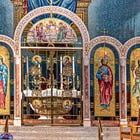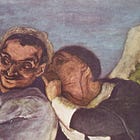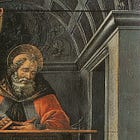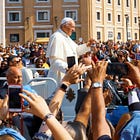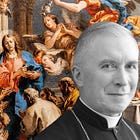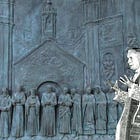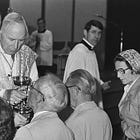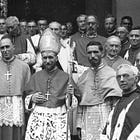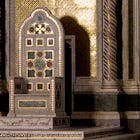+Lefebvre: 'Any sensible man must ask' if a heretic is still pope, can discuss with others
Archbishop Marcel Lefebvre said seminarians and priests could discuss the question of sedevacantism amongst themselves and even with the faithful, especially if necessary to safeguard the faith.

Archbishop Lefebvre’s most striking statement?
In his Easter sermon of 1986, Archbishop Lefebvre discussed provisions in canon law for communicatio in sacris (participating in non-Catholic rites):
‘But it is possible that we will be obliged to believe that this pope is not pope.’
When the seminary returned from the holiday, he elaborated on this sermon and ‘the Pope Question,’ in what may be his most striking statement of all.
Aside from the section in question, the conference is interesting in itself and contains some great insights into the current situation – even if some of the phrasing may seem inexact at times to some. We hope that readers find it useful and instructive.
It’s been objected that this series has not addressed what Archbishop Lefebvre thought, said and did after these statements. But the point of this series has not been to give an overall view of what he thought about the matter, to try to reconcile his statements, or to claim that these texts represent ‘What the Archbishop really thought.’
Rather, the point has been to refute certain sweeping statements about what he thought, said and did – and to show that we are as entitled to claim him as a teacher as anyone else.
As some further context, the Assisi gathering was on the horizon and ecumenism and inter-religious dialogue/services were multiplying. It is evident that this situation – which has only got worse since 1986 – was at the forefront of the Archbishop’s mind.
We include some commentary following the text.
Spiritual Conference
Archbishop Marcel Lefebvre
15 April 1986
Dear friends, during the holidays, you have had the opportunity to reflect on the Easter Sunday sermon!
... So, I would like to clarify a bit, as much as possible, given the diverse echoes and reactions, because the situation of the Church is so mysterious that it is not so easy to clarify things...
Let us first address why this position was taken, why we speak in such a manner about the acts of the Pope himself, and judge the acts of the Pope as we might do with cardinals, bishops, the Roman Curia, and so on.
The importance of faith
I think the answer is simple, isn’t it? We are convinced, and we must be convinced, that the first and foremost thing in our faith, in our Christian life, is faith itself.
Why Ecône, why the Society, why the resistance of so many priests and faithful?
... To preserve the faith, for it is the first commandment and the first obedience we owe to God, for the revelation he has given us, the revelation of his divine Son and his Incarnation, and his Mysteries: the Mystery of the Redemption, the Mystery of the Resurrection, of the Glorification. This is an entire revelation, communicated to us by God Himself.
And, in the face of this revelation from God, what should our first sentiment be?
Obedience: I believe. I cannot do otherwise than believe.
But this faith does not stand alone. This faith needs to be transmitted. And if it is to be transmitted, there must be organs for transmitting it. And that is why Our Lord established his Church, established his priests, established his priesthood. And at the same time as the faith, God gives grace, sanctification, and all the means of sanctification.
This is the Church. And this is what the Church has done for twenty centuries. It has organised, established, and structured itself in a certain way, if I may say so, for this purpose.
The importance of Rome for the faith
What is the Holy Office, if not the defence of the faith, the protection of the faith of the faithful, by all means at its disposal; the Holy Office of the Inquisition of the faith which seeks out all that can be harmful to the faith of the faithful and must protect the faithful against the attacks of error, the attacks of the evil spirit who obviously wants to introduce heresies and errors within the Church, within Christianity.
What is the Ministry of Propaganda, the Dicastery of Propaganda? It is the dicastery for the spread of the faith, de propaganda fide, that’s the title of Propaganda. So, the spread of the faith.
Why the dicastery of bishops? Because the bishops are the successors of the apostles, those who must spread the faith.
Why the Dicastery of Priests, of the Clergy? Because the clergy is responsible for spreading the faith, and therefore they need to be given directives, protected against the difficulties they may encounter. And this dicastery is responsible for the catechism, because priests are in charge of teaching the catechism; and thus it is the Dicastery of the Clergy that teaches the catechism.
All of this is naturally, I would say, evident. The whole Roman Church has been organised for the faith, to spread the faith, to communicate the faith, and at the same time, to communicate grace, of course: the Dicastery of Sacraments, the Dicastery of Worship, of Liturgy, of the adoration of God, of the manner of worshiping God.
And all of this functions in relation to faith.
The examples of the Apostles
This is what the apostles did. We need only cite two or three texts from the apostles, isn’t that so... Where Peter performed that extraordinary miracle of healing the paralytic; then, questioned by the chief priests who wanted to prevent them from speaking, Peter, filled with the Spirit, said to them:
‘Ye princes of the people and ancients, hear. If we this day are examined concerning the good deed done to the infirm man, by what means he hath been made whole:
‘Be it known to you all and to all the people of Israel, that by the name of our Lord Jesus Christ of Nazareth, whom you crucified –’
Whom you crucified, he does not fear to say it!
‘– whom God hath raised from the dead, even by him, this man standeth here before you, whole.
‘This is the stone which was rejected by you the builders, which is become the head of the corner. Neither is there salvation in any other.
‘For there is no other name under heaven given to men, whereby we must be saved.’
So, what will the chief priests do? Seeing the boldness of Peter and John, they recognised that a miracle had occurred, one they could do nothing against. So, what will they do?
‘And calling them, they charged them not to speak at all, nor teach in the name of Jesus.’
Keep quiet about Jesus, speak no more of him... Do whatever you want, but do not speak of Jesus! Peter and John replied:
‘If it be just, in the sight of God, to hear you rather than God, judge ye. For we cannot but speak the things which we have seen and heard.’
We must continue. That is it. You can see this same pattern throughout the Acts of the Apostles, always, always the same. So they began, they were taken back, imprisoned, and the same scenario unfolded: They were brought before the Sanhedrin again.
The High Priest questioned them, saying: we strictly commanded you not to teach in this name. And look, you have filled Jerusalem with your doctrine and intend to bring this man’s blood on us! But Peter and the other apostles answered:
‘We ought to obey God rather than men. The God of our fathers hath raised up Jesus, whom you put to death, hanging him upon a tree. Him hath God exalted with his right hand, to be Prince and Saviour. to give repentance to Israel and remission of sins.
‘And we are witnesses of these things: and the Holy Ghost, whom God hath given to all that obey him.
This is how the Apostles responded, always teaching about Our Lord:
‘And the word of the Lord increased: and the number of the disciples was multiplied in Jerusalem exceedingly. A great multitude also of the priests obeyed the faith.’
We must emphasise this term: obedient to the faith. Faith is an obedience. We must obey the faith.
Communicatio in sacris
And I think that is what is now crucial before our eyes, that we are faced with bishops, and even the Pope, who no longer obey the faith… because going to the Jews… These are essentially the same Jews, the same ones who rejected Our Lord. It is exactly the same thing, the same spirit. They are against Our Lord Jesus Christ.
They chanted, at the Pope’s departure from the Synagogue:
‘We are waiting for the Messiah, we are waiting for the Messiah, we are waiting for the Messiah…’
If they are waiting, it is because they do not believe in the One who came. It’s clear. So? Therefore, it is not possible to pray with people like that, it is not possible. There is a disobedience to the faith in Our Lord Jesus Christ. Our Lord Jesus Christ is no longer preached as he should be, as the Apostles did.
So we face this fact which theologians call communicatio in sacris. It is a fact: communicatio in sacris. Take your moral theology books. Go look under the virtue of faith, and you will see that with the virtue of faith, there is always a small chapter on the protection of the faith and the defense of certain things concerning the faith. Communicatio in sacris is generally forbidden. But it is distinguished between active and passive.
Passive participation is when someone, out of curiosity, attends a non-Catholic ceremony—always non-Catholic; they categorise all non-Catholics together: Protestants, Muslims, all possible and imaginable cults that are not Catholic. Passive participation means attending out of curiosity or for ceremonies involving friends, relatives, or others who are not Catholic, but always remaining passive: no prayers, no communication, no singing. They are absolutely passive. This is allowed in certain cases.
But active communicatio in sacris is absolutely forbidden, absolutely forbidden.
When it comes to prayers, songs, even touching the organ, it's forbidden, absolutely forbidden! Even if the words of the prayers are orthodox and not contrary to the Catholic faith.
Even so, it is not allowed because praying with those who do not share our faith, who do not have the Catholic faith, is, in a way, communing with them in their faith, a faith that is not Catholic. Thus, implicitly, it is an act contrary to the Catholic faith, and therefore an act that puts you in the situation of being suspect of heresy. And if you are warned and continue after six months, you are then considered a heretic.
What do you want? It’s a fact. The Pope prayed with them. And he has been announcing it these past few days—it was in the Osservatore Romano that I read today: all the announcements for Assisi—and the Pope announces that he will pray with all religions to God... What God? He will pray to God... thus with all religions for peace, supposedly...
That’s a problem, a theological problem, a problem you can consult... Canon Law, communicatio in sacris in the Canon Law dictionary by Naz, you will see what it says! Go consult all the moral books, on the virtue of faith, you will find communicatio in sacris. It's not very long, a bit less explicit than in Naz, in the Canon Law dictionary, but you will see what it is.
You will see if we are not facing just such a case.
Is the Roman Pontiff above the law?
Then you will say: ‘But the Pope is above the law.’
The Pope is not above divine laws! He is above ecclesiastical laws, okay. One cannot say that because he did that, he will be excommunicated: this is an ecclesiastical law, as a consequence of this suspicion of heresy and this heresy... but still, this is a law made by the Church, it's another matter.
But, concerning the suspicion of heresy and heresy, it is a direct consequence of communicatio in sacris, thus a communion with people who do not share our faith. That falls exactly under the prescription, the prohibition that Saint Paul makes to the Corinthians, saying:
‘Bear not the yoke with unbelievers […] What concord hath Christ with Belial? Or what fellowship hath light with darkness?’
It cannot be clearer. But Saint John also says the same thing. They forbid going to the unbelievers, communing with the unbelievers, being together... and even more so in prayer!
The publicity of John Paul II’s acts
Then, other problems arise. There is another problem than that. If it is indeed found that the Pope engages in communicatio in sacris and, consequently, is suspected of heresy and continues—he has done 3-4 similar acts, and he promises to do even more serious ones with all the religions of the earth—then... can a Pope be a heretic?
One necessarily asks the question. The answer will be: that's another problem, so it is not resolved, if you will, absolutely...
But still, I think it is enough to consult theologians, to consult all those who have studied these questions, to see... It is highly probable that, overall, theologians say that the Pope cannot be a public heretic, thus professing a heresy publicly like that.
But if there is something public, it is indeed what the Pope did, what he did two days ago. Perhaps a billion people on earth saw the Pope enter the Synagogue, as it is broadcast worldwide by satellites and the whole world could see it on television.
(You know, when I say the whole world, I am not wrong, because I assure you that... go to Peru, go to Bolivia, go to Colombia, go to the poorest neighbourhoods of the cities, the most miserable... people who have only four walls, and tin roofs over their mud walls, right, like in Peru... well, in Lima, as it never rains in Lima, there is no need for much shelter to protect from the rain: old tin sheets on top, or straw... there is television! Well yes, they have a television set! It is the first thing they buy! They have a television... Go to Bombay, in the poorest, most destitute neighborhoods, there is a television antenna! It is incredible! This television has an incredible influence!)
So everyone could see the Holy Father entering the Synagogue! So many Catholics, of course not just Catholics, but many Catholics saw that... poor people, little Christians from the countryside, without even realising it—because now we no longer have faith, that is the serious problem. We no longer have the Catholic faith, it has diminished everywhere, it is really reduced to very little—so they do not see the malice in this. The Pope went to visit the Jews, he shook hands with the Chief Rabbi, he made an act of charity, he made a courteous visit, etc.
They do not see it. That is the reaction of most people. Why?
Because they no longer have faith in Our Lord Jesus Christ.
They do not have faith in the unique salvation of the world, the unique Saviour of the world who is Our Lord Jesus Christ:
‘Oh! we are saved everywhere and even more so... since the Pope does that, so all religions are good, whether one is Jewish, Muslim, or whatever, it doesn’t matter... We all go to the same God...’
… as the Pope himself, unfortunately, says.
I have it in a speech from Cameroon; he explicitly states:
‘We Catholics believe that Jesus is the only way to God, but we respect all the ways that lead to God!’
... So, if there is only one way to lead to God, how can we respect all the ways that lead to God? So there are other ways that go to God... according to each one's conscience! It is incredible!
That is not what the Apostles said. They would have left the Jews in their good conscience, but not said that they had to convert!
The legitimacy of discussing a vacancy of the Holy See
Then this problem arises.
First problem: communicatio in sacris.
Second problem: the question of heresy.
Third problem: is the pope still pope when he is heretical?
I do not know, I am not making a decision! But you can ask yourselves the question. I think that any sensible man must ask himself the question. I do not know.
So now, is it urgent to talk about it?…
We may not talk about it, of course… We can talk about it among ourselves, privately, in our offices, in our private conversations, among seminarians, among priests, and all that…
Should we talk about it to the faithful? Many say: ‘No, do not talk to the faithful. They will be scandalised. It will be terrible, it will go far…’
Well. I told the priests, in Paris, when I gathered them, and then to you, I had already told you, I said: ‘I think that, little by little, we must still enlighten the faithful a little…’
I do not say that it should be done brutally, and throw this to the faithful to frighten them… No. But I still think that it is precisely a matter of faith.
The faithful must not lose the faith. We are responsible for keeping the faith of the faithful, protecting it. They will lose the faith… even our traditionalists.
Even our traditionalists will no longer have faith in Our Lord Jesus Christ. For this faith is lost! It is lost in the priests, it is lost in the bishops.
Apostasy from Christ and the importance of the faith
We no longer believe in the power of Our Lord Jesus Christ. We no longer believe in his divinity.
It was Cardinal Ratzinger himself who said it. He stated in his report:
‘Europe no longer believes in the divinity of Our Lord Jesus Christ, and particularly the European clergy no longer believes...’
Well, that's serious, it's the gravest thing one can say! They no longer believe in the supernatural virtue of Our Lord and that Our Lord is truly the means to save souls. So they seek only human means. Hence the theology of liberation. Hence all the revolutionary principles.
We no longer seek justice through virtue, through the grace of Our Lord Jesus Christ, through the conversion of souls, through the transformation of souls, the Christianization of souls: quicumque baptizati estis, Christum induistis, to each of those who were baptised: you have put on Christ.
That is Christian civilization, that is the transformation of souls, that is the true revolution that must take place in souls for Christian civilization. And not the revolution from the ground up, with weapons if necessary, against tyrants: that’s playing with fire! That’s inciting hatred among people.
So, this is the situation in which we find ourselves and we must always come back to this: let us have faith, let us revive our faith, because it is due to the loss of faith that the Council was what it was. Because the bishops no longer have faith, and the priests no longer have faith. That is why they abandoned the priesthood, that is why they sought to be worker-priests.
They sought to do anything: congresses and congresses, meetings, assemblies, Synods, and all that... supposedly for faith... But it is the grace of the Good Lord that is needed, it is the grace of Our Lord Jesus Christ, He is the one who will save, He is All-Powerful. He is God. He came expressly for this, to save us. He is the one who must save, it is not us, we are only instruments...
Will the Archbishop create a schism?
I think that is where the problem lies, isn't it? And they say: ‘Monsignor is going to make a schism...’
But who is making the schism? Not me! To make a schism, you have to leave the Church. And leaving the Church means leaving the faith first. Who is leaving the faith of the Church? Authority is at the service of faith. If it abandons the faith, it is the one making the schism. So, it is not us who are making the schism.
Note: For a cautious discussion of this treatment of the matter of the obedience due to authority, see below:
As for the question, which I have already spoken to you about, of consecrating a bishop, I would say now that the question becomes almost secondary, given that the serious problem we face, the one we have before our eyes, is what the pope is doing.
That is what is really tragic now, absolutely tragic... and which fills us with sadness, and which must also fill us with the desire to pray, to sacrifice ourselves, to beg the Good Lord to intervene...
I am not a prophet, but I wonder if the war that started today – because the open war of America against Libya began at 4:00 this morning – well, you know, it may be the spark that will set the world on fire. It may be God's response to the act the pope committed on Sunday. I don't know, I am not a prophet, but you know, in the current situation, it takes little for the explosion to occur worldwide.
If it happens that Russia wants to support Libya and starts sending missiles against American planes, it is world war. At the station this morning, they were commenting: American planes went to destroy barracks in Tripoli, they reduced the barracks to nothing this morning...
Trust in God
What will come of it?
One day, the Good Lord will have to speak. It is not possible that the Good Lord allows himself, I would almost say, to be set aside by those who must defend his, by those who must be his defenders...
It is not possible that this lasts indefinitely, that it is not possible!
15 April 1986
HELP KEEP THE WM REVIEW ONLINE!
As we expand The WM Review we would like to keep providing free articles for everyone. If you have benefitted from our content please do consider supporting us financially.
A subscription from you helps ensure that we can keep writing and sharing free material for all.
Plus, you will get access to our exclusive members-only material!
Thank you!
Editors’ Commentary
Once again, let’s look at the key section. This slightly different version is taken from Fr François Pivert’s book Nos rapports avec Rome, translated by The WM Review. Comparison with the above will show there are no significant differences.1
Archbishop Lefebvre’s Spiritual Conference, 15 April 1986
… First problem: Communicatio in sacris.
Second problem: The question of heresy.
Third problem: Is the Pope still the Pope when he is heretical? I don't know, I am not making a decision!
But you can ask yourselves the question. I think any sensible man must ask the question. I don't know.
So now, is it urgent to talk about it?
… We can certainly choose not to talk about it… We can discuss it among ourselves, privately, in our offices, in our private conversations, among seminarians, among priests, and all that…
Should we talk about it to the faithful? Many say: ‘No, no, no, don’t talk about it to the faithful, they will be scandalised. It will be terrible, it will go far!’
… Well. I told the priests in Paris, when I gathered them, and I had already spoken to you about it, I said: ‘I think, little by little, we must still enlighten the faithful a bit.’
… I’m not saying it should be done abruptly, throwing it out to the faithful to frighten them… No.
But I do think it is precisely a matter of faith. The faithful must not lose their faith. We are responsible for preserving the faith of the faithful, for protecting it.
They will lose their faith… even our traditionalists. [Ed.: According to one account, the Archbishop emphasised this passage vocally, separating each syllable.] Even our traditionalists will no longer have faith in Our Lord Jesus Christ.
Because this faith is lost. It is lost in the priests, it is lost among the bishops.(Emphases added)
Let’s note the following crucial points about this section:
Archbishop Lefebvre was openly discussing the idea that John Paul II was a heretic, and what this meant for his claim to the papacy.
The wider conference shows that he struggled to understand how John Paul II’s heresy could be construed as insufficiently public to cause loss of office. (In other words, he thought that prima facie, it was indeed sufficiently public.)
He acknowledged that it was legitimate for his priests and seminarians to discuss the question of the vacancy of the Holy See.
He considered it to be an important and urgent matter, rather than an irrelevancy, pertaining to the safeguarding of the faith. In fact, in a later 1986 text, he criticised those who treated the question as unimportant.2
He advised priests to discuss this question with the faithful, especially when it seemed that this possibility would help them maintain the faith.
He said that he did not know whether this was the case – but he did not say that it was impossible for anyone to know.
He was evidently not talking about a declaration in the distant future when he said ‘[i]t is possible that we will be obliged to believe that this pope is not pope.’ On the contrary, this statement means what it says.
Archbishop Lefebvre may have drawn back from some of these ideas, and it is certainly true that there are texts expressing different opinions and different times.
But no matter how much we love and respect the Archbishop, we do not need to try and harmonise everything he ever said. The point, rather, is that texts like this refute the idea that he resolutely and consistently insisted that John Paul II was a true pope.
Today, most are aware that the Archbishop admitted the possibility that the post-conciliar claimants were not true popes, and that the Church might declare so in the future.
But few seem to be aware that he went as far as this text shows.
What it means to treat this as an open question
It should be obvious that by acknowledging the legitimacy of discussing this question, the Archbishop was necessarily acknowledging the legitimacy of considering arguments both for and against the conclusion.
This simply cannot be evaded by comparing it to a speculative consideration of a proposition such as ‘Is Christ really present in the Holy Eucharist?’ and weighing up the objections and responses, as many theologians do in their works. What the Archbishop is talking about is different: no one would say that ‘any sensible person must ask the question’ whether perhaps Christ is not really present in the Eucharist.
On the contrary, this is not what Lefebvre meant. Nothing he said about discussing this question would make any sense if we were only allowed to reach a foregone conclusion of John Paul II’s legitimacy, as we would for such a question about the Eucharist. The question of Christ’s presence in the Eucharist is definitively closed; only one answer is possible; and introducing others (especially troubled laymen) to a conversation about whether this dogma might be false would be utterly scandalous.
As such, the text is clear, and no attempts at obfuscation can stand. Lefebvre acknowledged the legitimacy of discussing the question, which he treated as an open question. This necessarily entails the possibility that the priests and seminarians have the right to decide that the arguments for a vacant see are better, and to arrive at a conclusion with certainty.
The involvement of the laity
The text shows that he thought it was necessary for priests to carefully introduce the laity to the arguments, especially if doing so was necessary to help them keep the faith.
Personally, we have seen examples of such situations over the years, in which Catholics have come to be scandalised by the apparent contradiction between the ‘facts on the ground’ and the theses of traditional theology. In such cases, the possibility/certainty of the sede vacante conclusion has served as a powerful means for preserving the faith.
Archbishop Lefebvre recognised the truth: the salvation of such persons, and their preservation of the faith, is more important than the anxiety of those scandalised by the possibility of a long interregnum. In fact, such anxieties can sometimes prevent a comprehensive explanation of the arguments for the sede vacante conclusion, along with what it does and does not imply. Without this, individuals can sometimes be left with a confused understanding of the issues, which can sometimes drive them to sectarian groups, back to the modernists, or altogether out of the Church.
This is why many need precisely what Archbishop Lefebvre discussed – a frank, free and comprehensive discussion of the issue – which, we add, should ruthlessly exclude consideration of anxieties, scruples and tribal loyalties to groups.
We could go further. The text even suggests that the Archbishop was preparing the way for an actual inter-SSPX discussion on the question, with the faithful drawn into it on at least a case-by-case, need-to-know basis – if not acknowledged as being entitled to reach their own conclusions.
Conclusions
Whenever someone refers to something that Archbishop Lefebvre said, the first response from those who disagree is normally, “That’s out of context.”
It is for this reason that we have given the full text of the conference in question, as well as the two preceding sermons (to which he refers) as well as further details about the Assisi meetings. As such, the context is clear.
It could be objected that this acknowledgment is limited to those who are ‘sensible men’ – and this may well be true. No doubt most issues should only be discussed by sensible men.
Nonetheless, such a qualification evidently does not exclude the laity (holy orders are not what makes a man sensible), nor does it exclude the possibility that at some point, the issues may need to be discussed more widely.
That point may well be now.
Further Reading
HELP KEEP THE WM REVIEW ONLINE!
As we expand The WM Review we would like to keep providing free articles for everyone. If you have benefitted from our content please do consider supporting us financially.
A subscription from you helps ensure that we can keep writing and sharing free material for all.
Plus, you will get access to our exclusive members-only material!
Thank you!
Follow on Twitter and Telegram:
Trans. by The WM Review, taken from Abbé François Pivert, Son Excellence Mgr. Lefebvre – Nos rapports avec Rome, Le Combat de la Foi catholique, numéro spécial n. 167. Fr Pivert’s version of the text is slightly different in punctuation and minor phraseology to the text used for the whole conference – no doubt because transcribing an audio recording leads to such discrepancies. I have preserved these differences in the text.
We note that Fr Pivert attempts to mitigate the force of this text with a less strident text from 1978, which seems insufficient to achieve such a goal.
In the context of the Angelus article combining these questions and discussing the Pope Heretic question, the Archbishop said:
‘Now some priests (even some priests in the Society) say that we Catholics need not worry about what is happening in the Vatican; we have the true sacraments, the true Mass, the true doctrine, so why worry about whether the Pope is a heretic or an imposter or whatever; it is of no importance to us. But I think that is not true.
‘If any man is important in the Church, it is the Pope. He is the center of the Church and has a great influence on all Catholics by his attitudes, his words and his acts.’
Available here.

